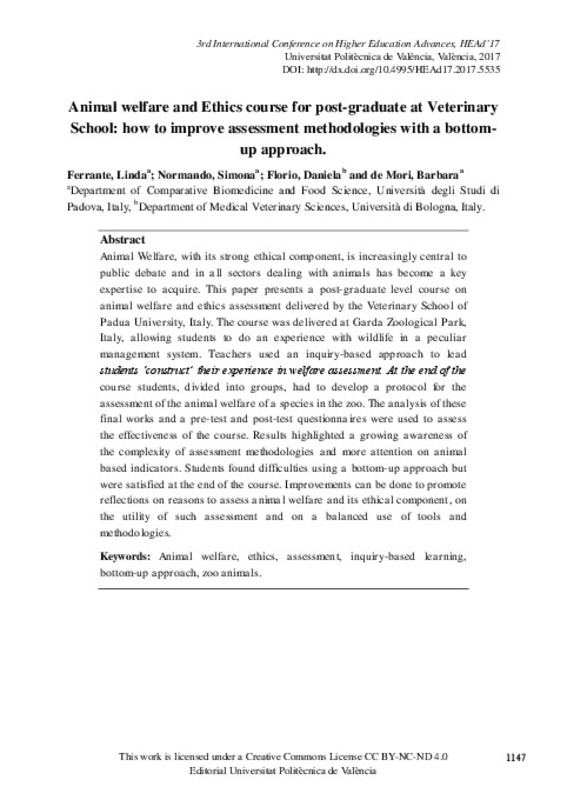JavaScript is disabled for your browser. Some features of this site may not work without it.
Buscar en RiuNet
Listar
Mi cuenta
Estadísticas
Ayuda RiuNet
Admin. UPV
Animal welfare and Ethics course for post-graduate at Veterinary School: how to improve assessment methodologies with a bottom up approach
Mostrar el registro sencillo del ítem
Ficheros en el ítem
| dc.contributor.author | Ferrante, Linda
|
es_ES |
| dc.contributor.author | Normando, Simona
|
es_ES |
| dc.contributor.author | Florio, Daniela
|
es_ES |
| dc.contributor.author | de Mori, Barbara
|
es_ES |
| dc.date.accessioned | 2018-06-18T06:56:19Z | |
| dc.date.available | 2018-06-18T06:56:19Z | |
| dc.date.issued | 2017-06-26 | |
| dc.identifier.isbn | 9788490485903 | |
| dc.identifier.uri | http://hdl.handle.net/10251/104292 | |
| dc.description.abstract | [EN] Animal Welfare, with its strong ethical component, is increasingly central to public debate and in all sectors dealing with animals has become a key expertise to acquire. This paper presents a post-graduate level course on animal welfare and ethics assessment delivered by the Veterinary School of Padua University, Italy. The course was delivered at Garda Zoological Park, Italy, allowing students to do an experience with wildlife in a peculiar management system. Teachers used an inquiry-based approach to lead students ‘construct’ their experience in welfare assessment. At the end of the course students, divided into groups, had to develop a protocol for the assessment of the animal welfare of a species in the zoo. The analysis of these final works and a pre-test and post-test questionnaires were used to assess the effectiveness of the course. Results highlighted a growing awareness of the complexity of assessment methodologies and more attention on animal based indicators. Students found difficulties using a bottom-up approach but were satisfied at the end of the course. Improvements can be done to promote reflections on reasons to assess animal welfare and its ethical component, on the utility of such assessment and on a balanced use of tools and methodologies. | es_ES |
| dc.format.extent | 9 | es_ES |
| dc.language | Inglés | es_ES |
| dc.publisher | Editorial Universitat Politècnica de València | es_ES |
| dc.relation.ispartof | Proceedings of the 3rd International Conference on Higher Education Advances | es_ES |
| dc.rights | Reconocimiento - No comercial - Sin obra derivada (by-nc-nd) | es_ES |
| dc.subject | Higher Education | es_ES |
| dc.subject | Learning | es_ES |
| dc.subject | Educational systems | es_ES |
| dc.subject | Teaching | es_ES |
| dc.subject | Animal welfare | es_ES |
| dc.subject | Ethics | es_ES |
| dc.subject | Assessment | es_ES |
| dc.subject | Inquiry-based learning | es_ES |
| dc.subject | Bottom-up approach | es_ES |
| dc.subject | Zoo animals | es_ES |
| dc.title | Animal welfare and Ethics course for post-graduate at Veterinary School: how to improve assessment methodologies with a bottom up approach | es_ES |
| dc.type | Capítulo de libro | es_ES |
| dc.type | Comunicación en congreso | es_ES |
| dc.identifier.doi | 10.4995/HEAD17.2017.5535 | |
| dc.rights.accessRights | Abierto | es_ES |
| dc.description.bibliographicCitation | Ferrante, L.; Normando, S.; Florio, D.; De Mori, B. (2017). Animal welfare and Ethics course for post-graduate at Veterinary School: how to improve assessment methodologies with a bottom up approach. En Proceedings of the 3rd International Conference on Higher Education Advances. Editorial Universitat Politècnica de València. 1147-1155. https://doi.org/10.4995/HEAD17.2017.5535 | es_ES |
| dc.description.accrualMethod | OCS | es_ES |
| dc.relation.conferencename | Third International Conference on Higher Education Advances | es_ES |
| dc.relation.conferencedate | June 21-23,2017 | es_ES |
| dc.relation.conferenceplace | Valencia, Spain | es_ES |
| dc.relation.publisherversion | http://ocs.editorial.upv.es/index.php/HEAD/HEAD17/paper/view/5535 | es_ES |
| dc.description.upvformatpinicio | 1147 | es_ES |
| dc.description.upvformatpfin | 1155 | es_ES |
| dc.type.version | info:eu-repo/semantics/publishedVersion | es_ES |
| dc.relation.pasarela | OCS\5535 | es_ES |








